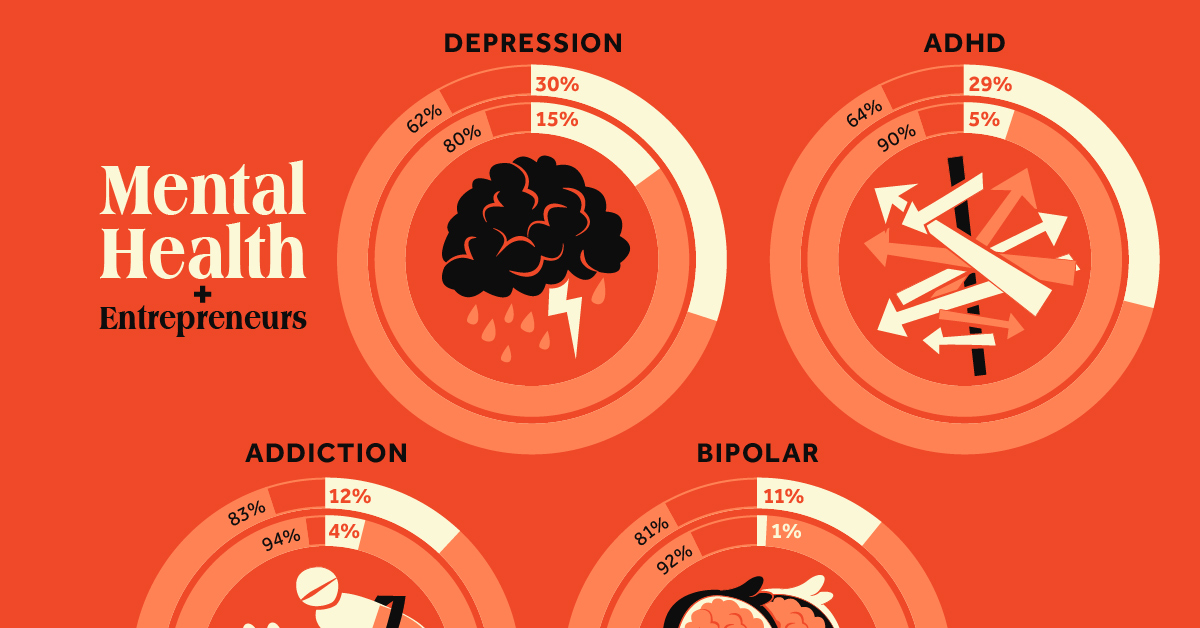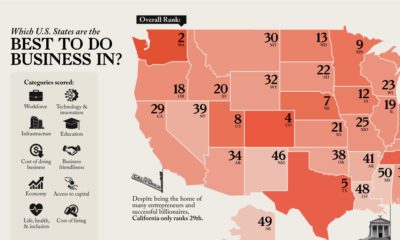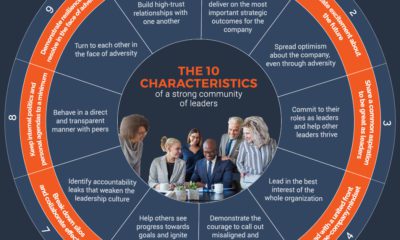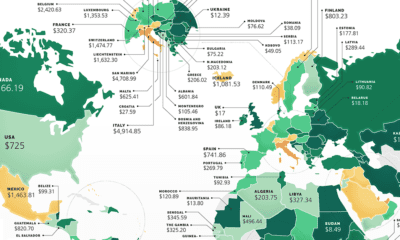Datastream
The Link Between Entrepreneurship and Mental Health Conditions
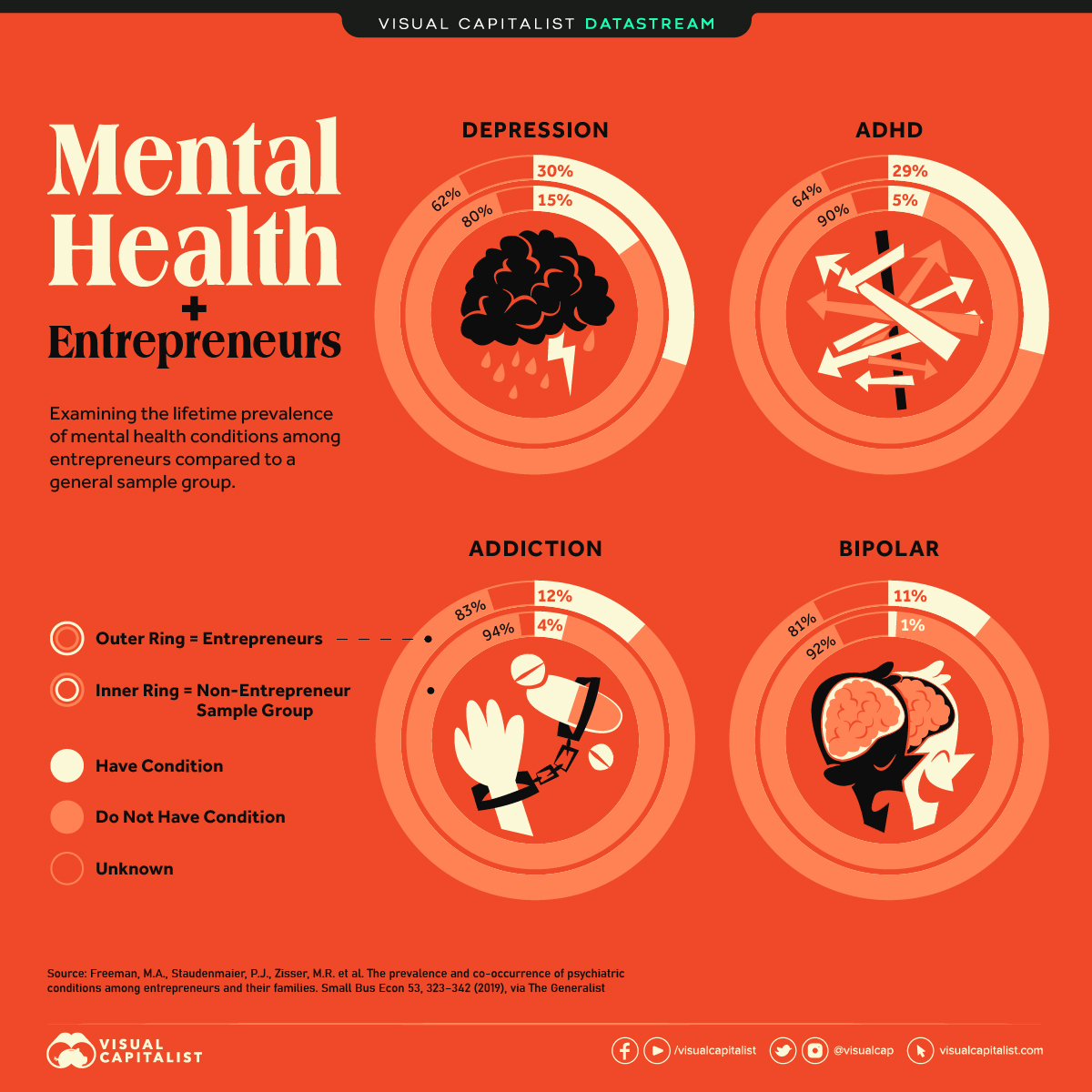
The Briefing
- Prevalence of ADHD, substance use disorders, and mood disorders appears to be higher in entrepreneurs than in the general public
- One-third of entrepreneurs reported two or more co-occurring mental health conditions
The Link Between Entrepreneurship and Mental Health Conditions
Entrepreneurship has long been associated with traits like risk-taking, persistence, and creativity. It’s no surprise, then, many of the world’s most successful companies were brought to life by neurodivergent founders.
Neurodivergence refers to natural differences in brain function among individuals with conditions such as autism, ADHD, dyslexia, and bipolar disorder. As this 2019 study demonstrates, entrepreneurs appear to experience mental health and addiction issues more frequently than the general public, and tend to have families with these illnesses at a higher rate.
Nearly half of entrepreneurs included in the study have one or more mental health conditions. Below the are the numbers for four of the conditions studied.
| Entrepreneurs | General Sample Group | |
|---|---|---|
| ADHD | 29% | 5% |
| Depression | 30% | 15% |
| Bipolar | 11% | 1% |
| Addiction | 12% | 4% |
The research also looked at anxiety, but found that levels were similar between entrepreneurs and the sample group.
Obsessive-compulsive disorder (OCD), dyslexia, and Asperger’s Syndrome, which are not included in this research, are other noteworthy conditions that are sometimes connected with entrepreneurship.
Asperger’s, in particular, is present in a number of successful founders, including Elon Musk and Bill Gates. Peter Thiel, billionaire investor and serial entrepreneur, has argued that this mild version of autism could be an asset in founding successful companies.
An Open Question
There are two competing ideas around the link between entrepreneurship and mental health conditions.
First, some posit that traits associated with mental health conditions (e.g. hyperfocus for ADHD, or attention to detail for Asperger’s) are assets in the startup world.
Secondly, it is also thought that because neurodivergent individuals have more trouble succeeding in conventional frameworks in academia and business, they are more likely to forge their own path by founding companies and pursuing self-employment.
It’s entirely possible that both these ideas are true. The more research that is published around mental health and entrepreneurship, the clearer view we have on the traits associated with creating successful businesses.
The more open the conversation is around mental health, the more we can create conditions in the workplace that empower neurodivergent individuals.
Source: Freeman, M.A., Staudenmaier, P.J., Zisser, M.R. et al. The prevalence and co-occurrence of psychiatric conditions among entrepreneurs and their families. Small Bus Econ 53, 323–342 (2019).
Data notes: Data was analyzed from 76 MBA student and faculty pool participants, 149 psychology students, and 110 entrepreneurs not affiliated with the university. Participants from either recruitment group who reported a history of self-employment or founding or co-founding a for-profit or non-profit business were categorized as entrepreneurs (n = 242).
Hat tip: We discovered this research via The Generalist who published a fantastic post on who becomes an entrepreneur.
Datastream
Can You Calculate Your Daily Carbon Footprint?
Discover how the average person’s carbon footprint impacts the environment and learn how carbon credits can offset your carbon footprint.
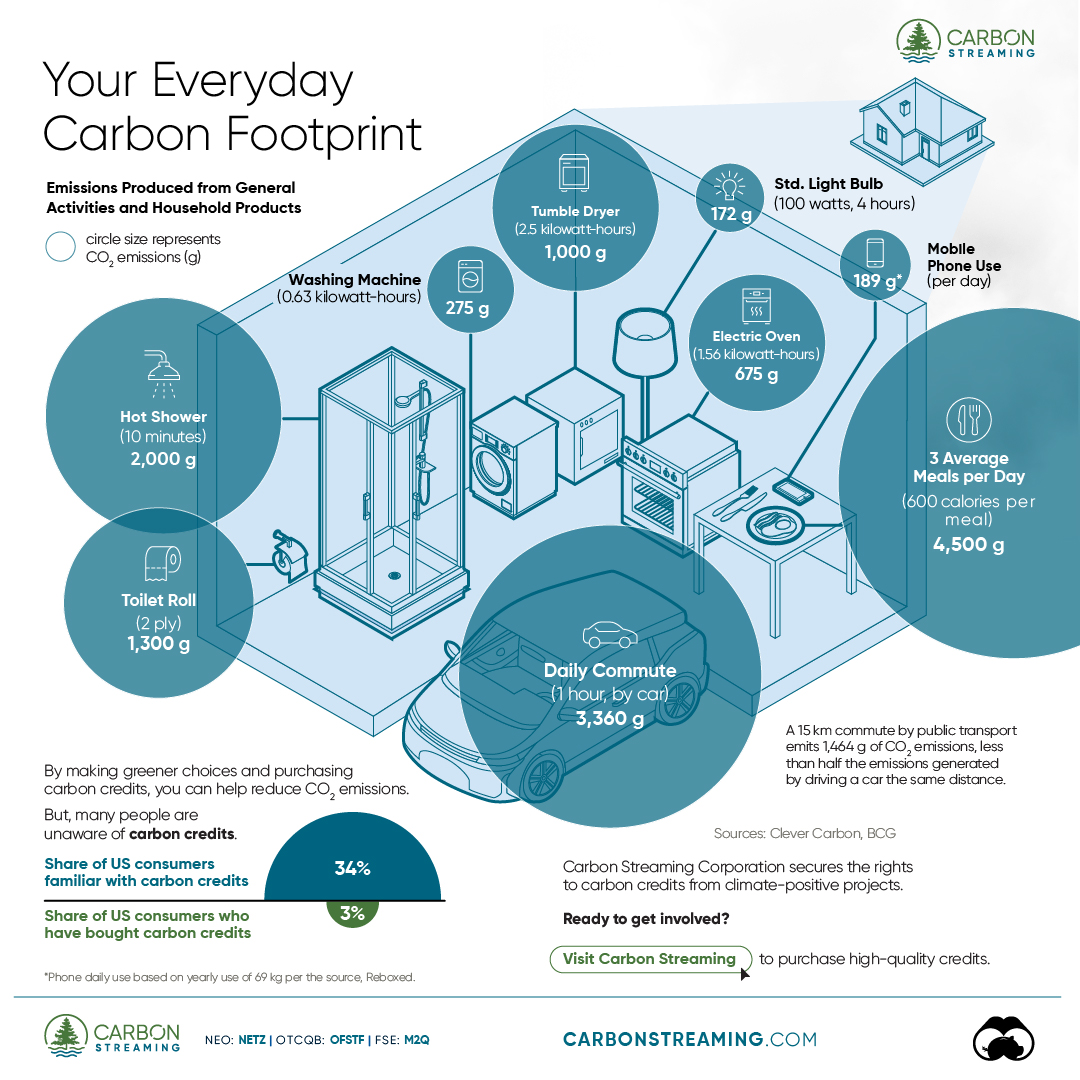
The Briefing
- A person’s carbon footprint is substantial, with activities such as food consumption creating as much as 4,500 g of CO₂ emissions daily.
- By purchasing carbon credits from Carbon Streaming Corporation, you can offset your own emissions and fund positive climate action.
Your Everyday Carbon Footprint
While many large businesses and countries have committed to net-zero goals, it is essential to acknowledge that your everyday activities also contribute to global emissions.
In this graphic, sponsored by Carbon Streaming Corporation, we will explore how the choices we make and the products we use have a profound impact on our carbon footprint.
Carbon Emissions by Activity
Here are some of the daily activities and products of the average person and their carbon footprint, according to Clever Carbon.
| Household Activities & Products | CO2 Emissions (g) |
|---|---|
| 💡 Standard Light Bulb (100 watts, four hours) | 172 g |
| 📱 Mobile Phone Use (195 minutes per day)* | 189 g |
| 👕 Washing Machine (0.63 kWh) | 275 g |
| 🔥 Electric Oven (1.56 kWh) | 675 g |
| ♨️ Tumble Dryer (2.5 kWh) | 1,000 g |
| 🧻 Toilet Roll (2 ply) | 1,300 g |
| 🚿 Hot Shower (10 mins) | 2,000 g |
| 🚙 Daily Commute (one hour, by car) | 3,360 g |
| 🍽️ Average Daily Food Consumption (three meals of 600 calories) | 4,500 g |
| *Phone use based on yearly use of 69kg per the source, Reboxed | |
Your choice of transportation plays a crucial role in determining your carbon footprint. For instance, a 15 km daily commute to work on public transport generates an average of 1,464 g of CO₂ emissions. Compared to 3,360 g—twice the volume for a journey the same length by car.
By opting for more sustainable modes of transport, such as cycling, walking, or public transportation, you can significantly reduce your carbon footprint.
Addressing Your Carbon Footprint
One way to compensate for your emissions is by purchasing high-quality carbon credits.
Carbon credits are used to help fund projects that avoid, reduce or remove CO₂ emissions. This includes nature-based solutions such as reforestation and improved forest management, or technology-based solutions such as the production of biochar and carbon capture and storage (CCS).
While carbon credits offer a potential solution for individuals to help reduce global emissions, public awareness remains a significant challenge. A BCG-Patch survey revealed that only 34% of U.S. consumers are familiar with carbon credits, and only 3% have purchased them in the past.
About Carbon Streaming
By financing the creation or expansion of carbon projects, Carbon Streaming Corporation secures the rights to future carbon credits generated by these sustainable projects. You can then purchase these carbon credits to help fund climate solutions around the world and compensate for your own emissions.
Ready to get involved?
>> Learn more about purchasing carbon credits at Carbon Streaming
-
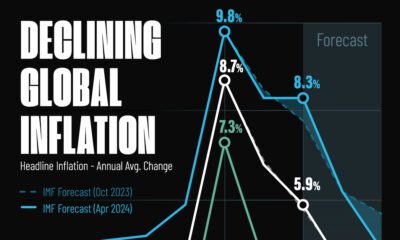
 Markets5 days ago
Markets5 days agoVisualizing Global Inflation Forecasts (2024-2026)
-

 Green2 weeks ago
Green2 weeks agoThe Carbon Footprint of Major Travel Methods
-

 United States2 weeks ago
United States2 weeks agoVisualizing the Most Common Pets in the U.S.
-

 Culture2 weeks ago
Culture2 weeks agoThe World’s Top Media Franchises by All-Time Revenue
-

 voronoi1 week ago
voronoi1 week agoBest Visualizations of April on the Voronoi App
-

 Wealth1 week ago
Wealth1 week agoCharted: Which Country Has the Most Billionaires in 2024?
-
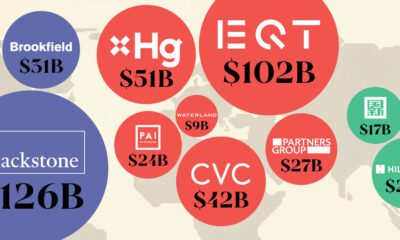
 Business1 week ago
Business1 week agoThe Top Private Equity Firms by Country
-

 Markets1 week ago
Markets1 week agoThe Best U.S. Companies to Work for According to LinkedIn




